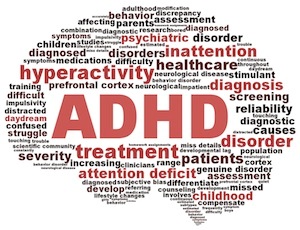Attention Deficit Hyperactivity Disorder (ADHD)

What Is Attention Deficit Hyperactivity Disorder (ADHD)?
Attention Deficit Hyperactivity Disorder is a neuro developmental psychiatric disorder in which there are significant problems with executive that cause attention deficits, hyperactivity, or impulsiveness which is not appropriate for a person’s age.
Causes Of Attention Deficit Hyperactivity Disorder (ADHD):
The definite cause of ADHD is yet unknown.
However, researchers claim that it is a result of interaction between genetic and environmental factors.
- Genetics
- Studies show that the disorder is often inherited from one’s parents with genetics determining about 75% of cases.
- Siblings of children with ADHD are three to four times more likely to develop the disorder than siblings of children without the disorder.
- Genetic factors are also believed to be involved in determining whether ADHD persists into adulthood.
- Environmental factors
The following factors are loosely linked to ADHD.
- Alcohol intake during pregnancy
- Exposure to tobacco smoke during pregnancy
- Exposure to lead
- Food dyes or preservatives
Risk Factors Of Attention Deficit Hyperactivity Disorder (ADHD):
The following factors increase the likelihood of getting ADHD:
- Blood relatives (such as a parent or sibling) with ADHD or another mental health disorder
- Exposure to environmental
- Maternal exposure to environmental poisons — such as polychlorinated biphenyls (PCBs) — during pregnancy
- Premature birth
Symptoms Of Attention Deficit Hyperactivity Disorder (ADHD):
Those suffering from ADHD may exhibit the following symptoms:
- Be easily distracted, miss details, forget things, and frequently switch from one activity to another
- Have difficulty maintaining focus on one task
- Become bored with a task after only a few minutes, unless doing something enjoyable
- Have difficulty focusing attention on organizing and completing a task or learning something new
- Have trouble completing or turning in homework assignments, often losing things (e.g., pencils, toys, assignments) needed to complete tasks or activities
- Not seem to listen when spoken to
- Daydream, become easily confused, and move slowly
- Have difficulty processing information as quickly and accurately as others
- Struggle to follow instructions
- Fidget and squirm in their seats
- Talk nonstop
- Dash around, touching or playing with anything and everything in sight
- Have trouble sitting still during dinner, school, doing homework, and story time
- Be constantly in motion
- Have difficulty doing quiet tasks or activities
- Be very impatient
- Blurt out inappropriate comments, show their emotions without restraint, and act without regard for consequences
- Have difficulty waiting for things they want or waiting their turns in games
- Often interrupt conversations or others’ activities
Diagnosis Of Attention Deficit Hyperactivity Disorder (ADHD):
There is no specific test for the diagnosis of ADHD.
However, the procedure for making a diagnosis may include the following:
- Medical exam,to help rule out other possible causes of symptoms
- Information gathering,such as any current medical issues, personal and family medical history and school records
- Interviews or questionnaires for family members, your child’s teachers or other people who know your child well, such as baby sitters and coaches
- ADHD rating scales to help collect and evaluate information about your child
Treatment Of Attention Deficit Hyperactivity Disorder (ADHD):
There is no treatment available which can cure ADHD. However, treatments can help relieve most of the symptoms.
Treatments include:
- Behavioral therapies
- Medications
- Stimulant medications
- Non stimulant medications
- Psychotherapy
- Social skills training
By : Natural Health News




